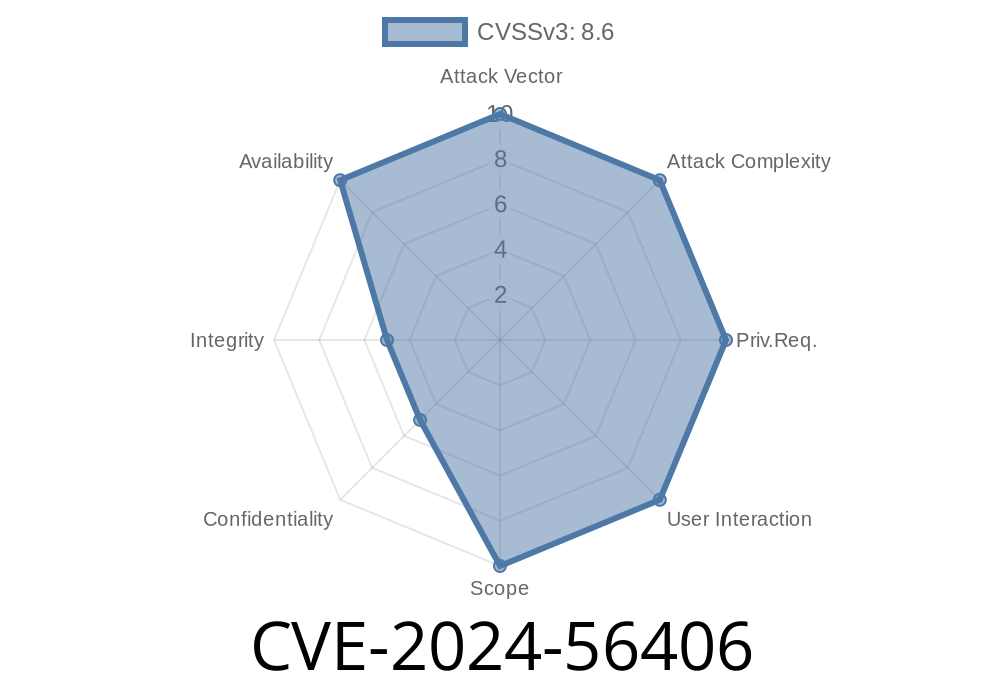A newly discovered critical security flaw affects several versions of the Perl programming language — a heap buffer overflow vulnerability tracked as CVE-2024-56406. This issue lives in the way Perl handles the tr/// operator (also known as y///), specifically when non-ASCII bytes are present on the left side of the translation.
This post breaks down the vulnerability in simple terms, shows you a demonstration and potential exploits, and points to original references so you can learn more.
What is CVE-2024-56406?
CVE-2024-56406 is a heap buffer overflow bug in Perl’s core engine, discovered in release branches 5.34, 5.36, 5.38, and 5.40. Development versions from 5.33.1 through 5.41.10 are also vulnerable.
The bug is triggered by the way Perl performs character mapping via the transliteration operator (tr/// or y///). If you use non-ASCII characters (for example, byte values over x7F) on the left side of the operator, Perl does not properly validate memory boundaries, allowing writes outside the bounds of allocated memory. This can cause a segmentation fault, crash the program (Denial of Service), or — in the worst case — allow for arbitrary code execution if exploited by attackers.
Perl development releases 5.33.1 – 5.41.10
- Any application, server, or user running scripts that process untrusted input through tr/// with non-ASCII bytes
Scripts that process external data (files, emails, form fields, logs)
- CI/CD pipelines or automation tools that embed Perl
Details and Code Example
The root of the bug is the internal Perl function S_do_trans_invmap, responsible for mapping and replacing characters in strings. When a wide character or byte greater than 127 is included on the left side, and the string being processed is sufficiently large, Perl attempts to map it but writes past allocated memory.
Exploit Demo
The following command will crash a vulnerable Perl interpreter by causing a heap buffer overflow — shown by a segmentation fault:
perl -e '$_ = "\x{FF}" x 100000; tr/\xFF/\x{100}/;'
$_ = "\x{FF}" x 100000;
This sets Perl's default variable to a string made up of 1,000,000 bytes, each byte being xFF (non-ASCII).
- tr/\xFF/\x{100}/;
Transliteration: replaces every xFF found with Unicode character x100.
On a patched system, this should complete normally or throw an error about translation size. On a vulnerable version, Perl will crash or produce a core dump.
An attacker can crash servers by sending malicious data, knocking your services offline.
Arbitrary Code Execution:
On systems with weak memory protections, an attacker may exploit the buffer overflow to execute custom code, potentially taking over your system.
While exploitation beyond denial of service is non-trivial, code execution remains a real risk, especially on platforms that do not use strong memory protections like ASLR or stack canaries.
Simple Exploit Scenario
Imagine you're running a Perl-based mail filter that processes user-supplied messages and uses tr/// for character normalization. An attacker sends a specially crafted email with a high number of xFF bytes. The filter processes it, crashes, and the attacker keeps your mail server down — or, with enough skill, plants malware or opens a shell on your system.
Technical Deep Dive
If you're interested in the details, here is the relevant piece of the upstream patch and vulnerability announcement:
Inside Perl source: S_do_trans_invmap
- Failure point: Destination pointer d overflows, because the calculation does not properly account for higher Unicode code points and the mapping array's size.
References
- CVE Record at NIST NVD
- Perl Security Advisory, GHSA-w57x-4c9w-42gg
- Perl 5.38.3 Release Notes (includes the patch)
- SecLists.org announcement
Versions 5.34.3, 5.36.2, 5.38.3, and 5.40.1 include the fix. Download the latest releases
- Perl Official Downloads
- Relevant Linux package managers already include fixed packages in recent distributions (check your distro security advisories).
Audit Your Code:
Check if you use the tr/// (or y///) operator on untrusted or external input, especially in long strings.
Conclusion
CVE-2024-56406 is an example of how subtle logic errors in language core engines can lead to dangerous outcomes even for mature projects like Perl. If you run Perl in any environment that handles potentially malicious content, patch ASAP or risk denial of service — or worse, remote code execution.
If you found this post helpful, share it with your sysadmins, developers, or security teams — and don’t forget to check your Perl version!
Timeline
Published on: 04/13/2025 14:15:14 UTC
Last modified on: 04/18/2025 17:15:34 UTC
